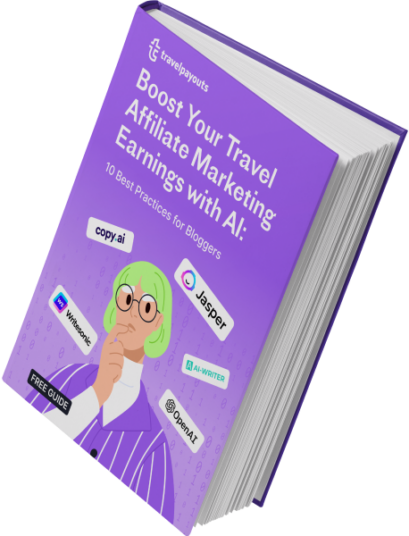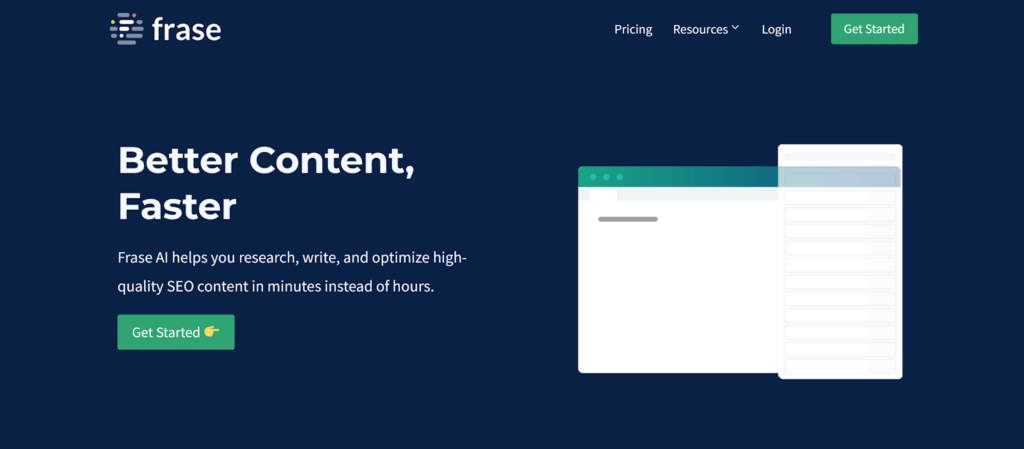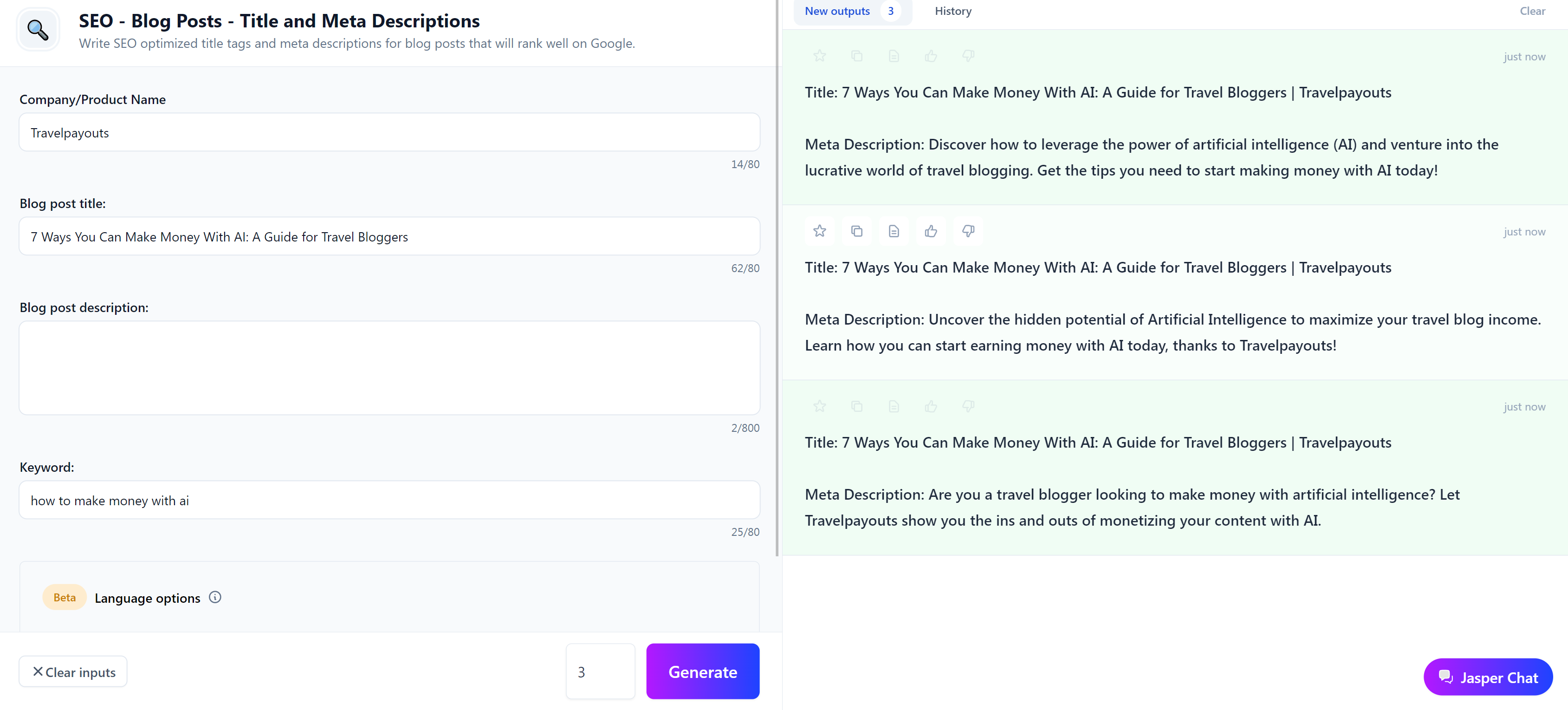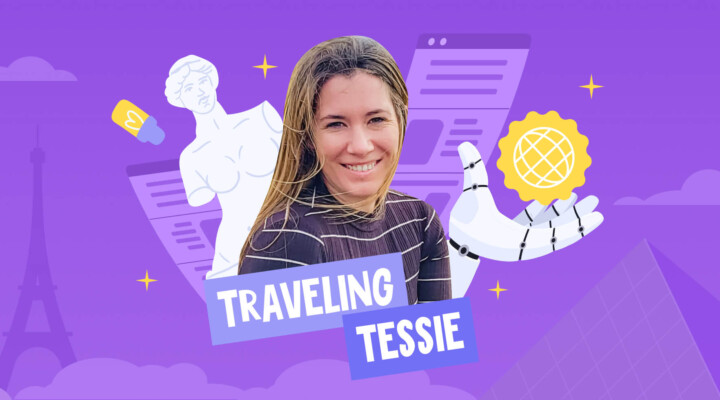Search engine optimization, or SEO, has existed for over 20 years. Still, with the introduction of AI systems, software, and tools, AI is quickly and radically changing SEO as we know it. With its ability to analyze large amounts of data and provide insights that would be impossible for a human to find, it is, in essence, democratizing SEO and making it available to everyone.
From Grammarly, which helps you fix spelling and grammar mistakes, to Ahfres, which identifies keywords, to programs like Jasper.ai and ChatGPT that will help you write your content, AI is helping bloggers and creators produce and execute content from start to finish.
In this article, we’ll explore how AI impacts SEO and provide tips and tricks on using AI to improve your website’s traffic and rankings.
How to Use AI in SEO to Increase Your Site’s Traffic?
AI is revolutionizing the world of SEO. With its ability to quickly analyze massive amounts of data and identify patterns, AI algorithms can provide insights we would not have access to otherwise.
In reality, there are many ways that AI SEO can help bloggers and content creators make data-driven decisions about their SEO strategy that can ultimately result in higher rankings, increased traffic, and more potential earnings.
Remember, although the conversation around AI has exploded due to ChatGPT, many tools you already use also use AI. Even if we don’t realize, AI is part of our daily life. When you open your iPhone with face recognition, use a voice assistant like Alexa, scroll through TikTok, or do a quick google search—that is all with the help of AI.
As a result, there are many ways to incorporate AI into your SEO strategy. From keyword research and content optimization to link building and site structure analysis, AI can provide a more in-depth and accurate data analysis, leading to data-driven decisions about your SEO strategy.
By leveraging AI technology, travel bloggers and content creators can improve their website’s search engine rankings, drive more traffic, and stay ahead of the competition.
What Is AI?
Artificial Intelligence, or AI, refers to the development of computer systems that can perform tasks that typically require human intelligence, such as visual perception, speech recognition, decision-making, and language translation. AI algorithms use machine learning, natural language processing, and other advanced technologies to process large amounts of data and make predictions based on that data.
There are two main types of AI: narrow or weak AI, designed to perform a single specific task, and general or strong AI, which can perform any intellectual task that a human can. Today, most AI systems are narrow AI, but there is ongoing research into creating general AI systems that can perform a wide range of tasks.
In digital marketing, AI is used to automate tasks, provide data-driven insights, and improve overall efficiency.
How Is AI Impacting SEO?
In the world of SEO, there are generally three main categories of AI tools: all-in-one SEO tools, such as Semrush and Ahrefs; content optimization tools, like SuferSEO and AI-powered content generators, like ChatGPT or Jasper.ai. Be mindful that each category represents a different way of demonstrating how to use AI in SEO. Plus, some tools can also be part of multiple categories.
All-In-One SEO
All-in-one SEO tools, such as SEMrush and Ahrefs, provide a comprehensive suite of tools and features to help website owners, marketers, and digital professionals improve their SEO efforts. Functions can include, but are not limited to, site auditing, backlink analysis, competitor analysis, and keyword research.
SEMrush, Ahrefs, and Moz Pro are considered to be the top all-in-one SEO tools for those with advanced SEO knowledge and professional needs. However, these comprehensive solutions may not be the best fit for beginners or those on a budget.
In those cases, consider options like Keysearch or UberSuggest. Often used by travel bloggers and content creators, Keysearch provides all the necessary functions needed to find the perfect keyword, while also being simple to use and quite affordable. Some key features include: keyword research, content assistant, rank tracking, competitive analysis and Youtube research.
Content Optimization
Content optimization is another area where AI is having a major impact on SEO. Content optimization tools, like Jasper, SuferSEO, Clearscope, Frase.io, Outranking and MarketMuse, use AI algorithms to analyze your content and provide recommendations for improvement. These tools have features like recommended semantic keywords, SEO audit, keyword research, competitive analysis and more. Some, like MarketMuse and Frase.io also AI-powered content generators via a high-quality AI writer.
One of the most popular content optimization tools on the market is SuferSEO as it provides you with all the tools needed to create content that ranks. Another great SEO tool is RankIQ, as it is tailored specifically just for bloggers.
But content optimization is nothing without the proper writing tools. Yes, your article should be SEO-optimized but it also should be easy to read. Here are a couple of AI writing tools that should be part of every copywriter’s arsenal:
It is important to note that achieving a high SEO score in optimization tools should not be your sole focus when creating content. Although these tools can provide valuable insights and recommendations, they do not guarantee a well-ranking article. The primary objective of any piece of content is to inform and engage readers with relevant and valuable information.
Striking a balance between SEO best practices and meaningful content is crucial, and using your best judgment when utilizing these optimization tools will ultimately lead to more effective, user-centric content that resonates with your audience.
Check out the free guide from Travelpayouts’ experts to find 10 of the best practices for making the most of AI technology in your travel blogging business.

Boost Your Travel Affiliate Marketing Earnings with AI
AI-Powered Content Generators
Last but not least, another group of AI tools that is becoming increasingly popular is AI-powered content generators. These generators are tools that use AI algorithms to generate content based on specific topics, keywords, or user inputs. These tools are designed to help save time and effort in creating high-quality content for websites, social media, or other digital platforms.
Various generators provide specific functions for different needs, even within this particular category.
Tools like Jasper.ai and Copy.ai are specifically AI copywriting tools. But even these tools have their own pros and cons. Copy.ai is known for generating social media content and fulfilling short-form copywriting needs, while Jasper.ai performs better with long-form content. Another example is MarketMuse, which provides tools for developing topics and content briefs, as well as machine learning and AI-based research and insights such as topic analysis and search intent-related insights. Another example is SEO.ai, touted as the #1 AI writer for SEO.
Then there is the famous ChatGPT, which (kind of) does it all. ChatGPT is a language model developed by OpenAI. Known for its versatility, it can be used for various tasks, including content generation, answering questions, and even language translation. With its ability to understand and generate human-like text, ChatGPT has become a go-to tool for anyone looking for content creation.
But it does come with some cons and limitations. Unlike other tools mentioned, ChatGPT can’t, for example, perform keyword research or provide real-time information on search volume and competition for specific keywords.
What Is AI-Generated Content and Why Should Content Creators Care?
AI-generated content refers to content that is created or optimized using AI algorithms. This type of content is designed to provide value to the reader and improve the user experience, while also satisfying the needs of search engines. For content creators, AI-generated content can streamline the content creation process and save time for more strategic work.
The main benefits of AI-generated content are plentiful and depend on the types of tools that you will be using. Tools can help with content creation, keyword research, optimization, and more. Frase.io says it is best on their website when they say that they can help you research, write and optimize high-quality SEO content in minutes instead of hours. That’s the main benefit: time.

As many bloggers and content creators know, you are a one-person show until you start earning the big bucks. As a result, it can be challenging to manage all the different tasks involved in creating high-quality content, from research to writing to editing and optimization. Plus, let’s not talk about marketing; that’s another story.
AI-generated content can help simplify this process. It allows you to focus on the more strategic aspects of content creation. Using AI-generated content and AI SEO and content tools, you can take some of the workloads off your shoulders and free up time to focus on what truly matters: creating great content that resonates with your audience and drives real results.
7 Tips to Improve Your Website With AI SEO
So how can you improve your website with AI SEO? Let’s look at some key specific tips and tricks that you can implement today.
Tip 1: Generate Content Ideas Using AI
One of the benefits of AI-generated content is its ability to help content creators generate ideas and plan their content strategy.
AI tools can help analyze data and provide insights on what topics and keywords are trending and what your target audience is searching for. This can help you generate ideas for new content that is relevant and valuable to your audience.
To generate content ideas using AI, you can use keyword research tools to identify popular keywords related to your niche.
You can then use AI-powered content generators to analyze this data and generate a list of potential content ideas. These tools can even suggest titles, headlines, and subheadings included in your content.
RankIQ, for example, has a keyword library organized by specific niches. The tool lists keyword phrases, competition, visits per year, and the time to rank (very fast versus average). Once you run a report for that specific keyword, it will provide a list of features, including content targets (like word count), a googling ranking analysis, and a list of related keywords to help you build your content outline. This brings us to tip number two.
Tip 2. Write Post Outlines Fast
One of the biggest time-consuming tasks in creating content is creating an outline for a post. However, many of these AI-powered tools help speed up this process by providing the option of creating an outline for you.
The tools analyze data on inputted keywords and topics and provide suggestions for post structure, including headings, subheadings, and even main points to cover. Some even have this feature built into their offering, like SurferSEO and their Outline Builder. This feature provides users with proposed headings and unique paragraphs based on competitors’ content. Frase.io also has a feature, which is called Content Briefs.
Regardless of the tools you use, whether SuferSEO or ChatGPT, these AI tools can create an exciting outline (or two) that can inspire your next content masterpiece.

Tip 3. Create Optimized Titles and Meta Descriptions
Titles and meta descriptions are critical when talking about SEO. As a result, it is essential to create optimized titles and descriptions that include your keyword and also entice users to click through to your site.
But creating that perfect eye-catching title can be tricky, especially when you must include a mix of common, uncommon, emotional, and power words while also having a positive sentiment.
AI can help you create titles and meta descriptions that are both optimized for search engines and appealing to users, increasing the chances of your content appearing at the top of search engine results pages. Many tools offer this specific feature, including Jasper.ai, which has a free meta description generator for SEO.

Tip 4. Write SEO-Optimized Content
AI tools can provide various features to help you write perfectly optimized content. The type of AI tool you choose depends on your needs and goals. From keyword research and content ideation to optimization and writing suggestions, AI technology can streamline the content creation process and help you easily create high-quality, SEO-friendly content.
All-in-one SEO tools, like Keysearch, can help you find the right keywords while providing features like a content assistant, a content optimization tool with the primary goal of assisting users in maximizing the traffic and ranking potential of their chosen topic. Content optimization tools like SuferSEO can help you compare and analyze your pages against what currently ranks. And AI writers can help you pull it all together and write SEO-optimized content. These tools can work perfectly in sync, depending on what you need.
As mentioned earlier, it is important to remember that although ChatGPT can create text optimized for search engines, it is not an SEO tool. It can not perform keyword research, analyze site structure, or perform other tasks for optimizing a website or an article for search engines. However, it can be a powerful tool alongside other SEO tools, especially for content generation.
Tip 5. Use AI to Increase Website Engagement
Have you ever clicked on one of the questions under the People Also Ask featured snippet when googling a specific topic or keyword?
Often a missed opportunity, questions can help drive more potential users to your website and yes, AI can help with that as well. It can be as simple as asking ChatGPT to come up with some questions that people may ask surrounding a specific topic or niche.
Tip 6. Improve Existing Content with AI Tools
Several AI tools out there solely focus on optimizing your content for SEO. Most of these tools have some features concentrated on optimization. From keyword optimization and content analysis to writing suggestions and competitor analysis, optimization can help you identify areas for improvement and help you rank on the first page of Google.
Content optimization allows you to input your content into an editor that will, in real time, provide you with a content grade for a keyword/key phrase. Your content is compared against competitors, and the tool offers recommendations like suggesting related keywords or necessary word count. This is done so that your content can outrank your competitors. Tools that provide this type of editor include Keysearch, RankIQ, SuferSEO, SEO.ai, Frase.io and many more.
Tip 7. Optimize Your Content for Voice Search
As we all know, voice search is becoming increasingly popular. More and more people rely on virtual assistants like Siri, Alexa, and Google Assistant to find the answer to basic questions. Hey Alexa, how far is Paris from Brussels?
As a result, optimizing your content for voice search is important to reach a wider audience and improve your search engine rankings.
And again, AI can help with this. It can help you optimize your content for voice search by using conversational language, focusing on long-tail keywords, using question-based keywords, optimizing for featured snippets, and helping you ensure your website is mobile-friendly.
To get more tips, watch a masterclass from Nina Clapperton on how to use AI to write engaging and SEO-friendly blog posts.
Things to Watch Out for With AI SEO
While AI tools and generated content can be valuable assets for marketers and bloggers, it’s essential to remember that a manual human check should always be performed before any content is published. Although we love AI, it is not error-proof. It often does contain inconsistencies and mistakes that can harm your website’s reputation or tank your SERP ranking.
For example, AI algorithms can sometimes need help understanding context, tone, and the nuances of language, which can result in awkward or incorrect phrasing. Other issues can include:
- A bias in the training data.
- Difficulty with abstract or conceptual questions.
- Inconsistent or nonsensical responses.
Also, AI-generated content may not always be relevant or valuable to your target audience, as it is generated based on data and algorithms rather than a deep understanding of your target audience and their needs.
Another big thing to consider is that ChatGPT’s training data has a knowledge cutoff of 2021. So any new information or events that emerged after that time may not be reflected in AI responses.
All of this demonstrates that although AI has taken huge strides forward in recent years, there still needs to be a human mind behind the computer to make sure everything makes sense. While AI tools can help streamline the content creation process and provide valuable insights and recommendations, they should be a starting point rather than a final solution.
The Most Popular AI SEO Tools in 2023
If you are looking to include some AI SEO tools in your writer’s tool kit, here are some of the most popular AI SEO tools to check out in 2023.
| Name | Type | Free Trial | Starting at |
| Jasper.ai | Content Optimization tool and AI writer | 10,000 words for free | $29.00/month |
| NeuronWriter | Content Optimization tool and AI writer | No free trial | €19.00/month |
| SurferSEO | Content Intelligence platform: content strategy, creation, and optimization | No free trial. 7 day money back | $49/month |
| Outranking | All-in-one AI SEO tool: strategy, content and optimization | No, but one month Starter plan for $7/per month | $79/month |
| Frase.io | Similar to SurferSEO, with more focus on writing than editing | 5-day free trial for only $1 | $14.99/month |
| MarketMuse | All-in-one AI SEO tool: strategy, content and optimization | Free-forever plan. 1 user to use 15 queries/ month & basic features. | $7,200/year |
| SEO.ai | SEO-focused AI writer | 7 day free trial | 46/month |
| Keysearch | Keyword research & content optimization | No free plan or trial | $17/month |
| SEMRush | Keyword research & content optimization | Free trial available | $119.95/month |
| Ahrefs | Keyword research & content optimization | No free trial | $89/month |
| Moz Pro | Keyword research & content optimization | Full access for free for 30 days | $99/month |
| RankIQ | Keyword research & content optimization | No free trial | $49/month |
| ChatGPT | AI language mode, not technically an SEO tool | Free plan available | $20/month |
Final Thoughts: AI in SEO
Let’s be honest, AI’s potential is mind-blowing. When done right, it can do some pretty cool things. With the vast array of AI SEO tools available today, travel bloggers and content creators can analyze data, find keywords, create high-quality content, and crush all their SEO goals.
Whether you’re a seasoned pro or just starting, AI in SEO can help you achieve your goals and drive more traffic to your site. So why not join the AI SEO revolution and start optimizing your travel content today?
Also, why not consider joining Travelpayouts, an affiliate network that helps travel bloggers monetize their content by providing them access to a wide range of travel products and services? With Travelpayouts, you can earn money while sharing your travel experiences. Because in the end, AI helps with SEO, which increases traffic and the potential to make more money with your passion. Is there anything better?




